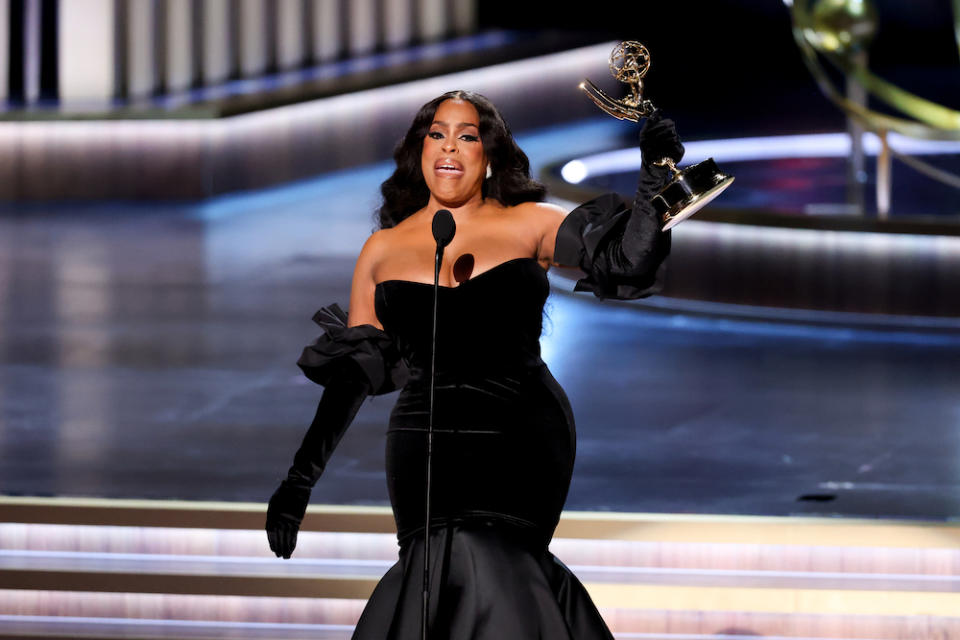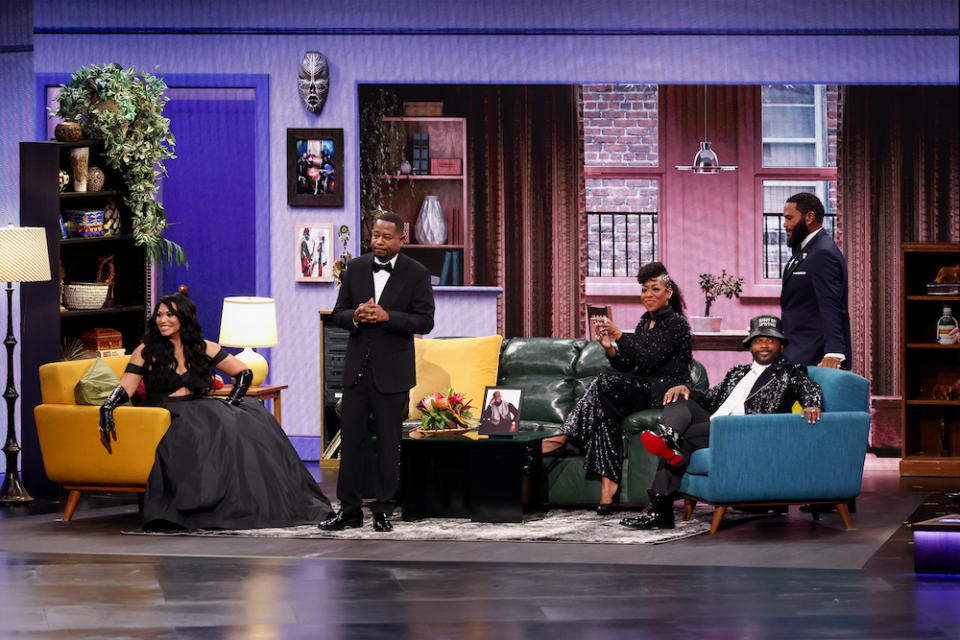The Emmys Deliver a Low-Key Charmer with Anthony Anderson, Delightful Winners, and Nonstop Reunions

The 75th Primetime Emmy Awards were destined to feel out of step. The four-month delay to accommodate the writers’ and actors’ strikes put Monday night’s ceremony right in the middle of the winter awards race, which would always pose a problem — between our nightly dose of NFL games and awards shows crowding every weekend, there are simply too many live events in January — but the move felt especially discombobulating in 2024. These Emmy nominees weren’t just a year old; they dated back to June 2022. (Lest we forget, the Emmy eligibility window remains pegged to the old broadcast schedule, rather than the calendar year.) That means recent contenders we just saw at the Golden Globes or among the SAG nominations — like Emma Stone in “The Curse” and Jon Hamm for “Fargo” — weren’t eligible.
Hamm, bless his soul, still showed up as a presenter, but he wasn’t even introduced as the current star of an FX anthology series, nor as the upcoming voice actor and executive producer of Fox’s own “Grimsburg.” Instead, he was brought out as the face of “Mad Men,” in keeping with the night’s theme: partial reunions of Emmy-winning (and, oddly enough, not Emmy-winning) TV shows. To honor the awards’ 75th anniversary, members of Emmy juggernauts like “Cheers,” “The Sopranos,” “American Horror Story,” and “SNL” trotted out on stage — usually, surrounded by a familiar set from their iconic shows — alongside the Emmy-less ensembles of “Martin,” “Community,” and “It’s Always Sunny in Philadelphia.” (Technically, “Community” is an Emmy winner, albeit better known for its many snubs.)
More from IndieWire
Intentional or not, the indiscernible pattern of presenters — some from award-winning series, others from snubbed snows, some with four or five series regulars, others with just one person, etc. — actually helped set a fittingly funky tone and tempo, as if the broad themes of “TV” and “history” were chosen specifically so the 2023 Emmys (held in 2024) could feel like they took place out of time; to make it easier for everyone to embrace this year’s weird scheduling and bad luck; to invite audiences to forget what year they were watching the show, and just remember some of the many reasons they love television.
Maybe one reason sprang up from an era before you were born. Maybe another was from a show you just finished tonight. Who cares? These days, a “new” show could mean anything. It could be a show that just premiered, or a show you just watched, or a show you just found out existed at all. What matters is you’re watching, and even if virtually no one watched the Emmys this year, Monday night’s telecast made sure to give onlookers good reasons to keep tuning in — no matter what they’re tuning in for.
At the top of the broadcast, Anthony Anderson took it easy. “Mister Anderson’s Neighborhood” offered an aptly low-key lead-in for the night, as the host riffed a few TV theme songs (with the help of six Compton choir members) before introducing the night’s substitute for the “play-off” music: his mother, Doris Hancox. Mama Anderson did indeed stand and holler at the award recipients who ran long, as first evidenced by Jennifer Coolidge getting cut off after thanking “all the evil gays.” While it felt a touch disrespectful at first (since Emmys actually matter, unlike Golden Globes), if a beloved comedian known for her improv skills can’t get an extra few seconds to finish up, no one can — a message the rest of the night’s winners took to heart.
Mrs. Hancox only had to stand up a few more times, and even then she was usually prompted by the speaker — like when John Oliver threatened to recite the entire Liverpool football club roster from memory unless he was “played off by Anthony Anderson’s mom.” In other words, the gambit worked. Long speeches usually don’t play as well as heartfelt insights, but even worse is when the wrap-up music interrupts a genuine moment. That didn’t happen with the host’s mother watching the clock, and for that, we can all be thankful.

As for Anderson himself, he took the form of a traditional host more than a traditional awards host. There was no joke-filled monologue, no recurring bits, and no disappearing act. He introduced the night’s themes — reunions! history! TV! — then returned, again and again, to make sure things continued to run smoothly. He wasn’t an additive presence, like the best of the best, but his professionalism and ability to read the room went a long way, especially after this year’s disastrous Golden Globes.
The best speeches felt the least rehearsed. Quinta Brunson was so overwhelmed she could barely speak. “I don’t even know why I’m so emotional,” she said, before mentioning her presenter — Carol Freaking Burnett — as one possible explanation. Niecy Nash-Betts was the clear winner among winners, delivering a thoughtful, passionate, and personality-filled tribute “on behalf of every Black and brown woman who has gone underheard and over-policed […] as an artist my job is to speak truth to power, and I’m going to do it until the day I die.” Trevor Noah, with one of the night’s few surprise victories, was equal doses sincere and sharp, showing clear excitement over the honor while still quipping, “I told you we would beat John Oliver if he wasn’t in our category!” (“Last Week Tonight” shifted from Variety Talk, won by “The Daily Show,” to Scripted Variety Series, where it still won.)
As for the reunions, Tina Fey and Amy Poehler were sharp as ever, sitting behind the “Weekend Update” desk again, albeit too short-lived. Calista Flockhart and the “Ally McBeal” cast actually did the dance, which was just as goofy and charming as ever (and exactly the right length). “Community” brought out Joel McHale and Ken Jeong while Donald Glover watched from the audience, the “Martin” cast got to inhabit their set again, and “Gray’s Anatomy”… happened. That the reunions pulled double-duty — as nostalgic audience hooks and to present actual Emmys — helped save time, and although the individual moments weren’t wholly satisfying (for truly fulfilling reunions, may I recommend a trip to the ATX TV Festival?), their total impact lent the show a sweet, pensive element that helped make Emmys No. 75 unique.
If forced to choose the worst moments (which does tend to come with the territory of writing reviews), I’d start with the misleading music cues. Why did the “Curb Your Enthusiasm” theme serve as a lead-in for the “Cheers” reunion? Why am I expecting to see David Duchovny and Gillian Anderson on stage after “The X-Files” music hits, only to then hear Don Draper cracking jokes? (Good jokes, but still.) Paul Walter Hauser’s acceptance speech took nonchalance to an unfortunate extreme, as he chewed (literally) through a hard-to-track and harder-to-listen to rhyme scheme. “Black Bird” is an eloquent, thoughtful, and viciously entertaining limited series. Hauser deserved the win, but the show deserved a better spotlight than he provided.

Also: Can we stop with the equally confounding musical guests? The Oscars got Eminem, the Emmys get… Travis Barker? Nah, let’s just stick with TV icons, thanks. And speaking of unnecessary intrusions: I get that Coleman Domingo is fighting for an Oscar nomination right now, but you are here, sir, because you won an Emmy for “Euphoria,” and you won an Emmy for “Euphoria” (in part) because you were on over 100 episodes of “Fear the Walking Dead.” So let’s leave “Rustin” out of your introduction.
If it seems like I’m grasping at straws, that’s because I am. Truly, the worst moments of the 75th Emmys were innocuous ones; the speeches that were nice but unmemorable, the snubbed shows you would’ve loved to see recognized, and the bits that were plain and unmotivated. But to complain too much about those would be to complain about watching awards shows at all. There are always going to be minor annoyances (for instance, I wish there were more clips shown for the nominees, but I understand that they add up to a lot of time when there’s 27 categories to hand out), and there are always going to be airless “thank yous.” That’s fine. No big deal. Awards shows live and die with the speeches, as they should, and it’s the producers’ job not to get in their way (which this year’s team, led by Jesse Collins, avoided).
The 75th Emmys were given an impossible task: to put on an awards show half-a-year late, in the middle of an already overcrowded awards season, against TV competition they would never, ever topple. (Even tuxedo-clad Emmy guests were watching football — sorry about your Eagles, Rob.) And yet, the Emmys still put on a good show. How nice. TV: Even when we’re not there for it, it’s always there for us.
Grade: B
The 75th Primetime Emmy Awards were held Monday, January 15 at 8 p.m. ET on Fox.
Best of IndieWire
Sign up for Indiewire's Newsletter. For the latest news, follow us on Facebook, Twitter, and Instagram.
